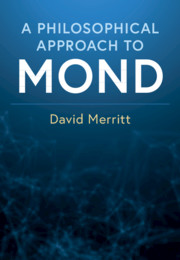Book contents
- Frontmatter
- Dedication
- Contents
- Preface
- 1 The Epistemology of Science
- 2 The Methodology of Scientific Research Programs
- 3 The Milgromian Research Program
- 4 Theory Variant T0: The Foundational Postulates
- 5 Theory Variant T1: A Non-relativistic Lagrangian
- 6 Theory Variant T2: A Relativistic Theory
- 7 Theory Variant T3: A Modified Hard Core
- 8 Convergence
- 9 Summary / Final Thoughts
- References
- Index
- Frontmatter
- Dedication
- Contents
- Preface
- 1 The Epistemology of Science
- 2 The Methodology of Scientific Research Programs
- 3 The Milgromian Research Program
- 4 Theory Variant T0: The Foundational Postulates
- 5 Theory Variant T1: A Non-relativistic Lagrangian
- 6 Theory Variant T2: A Relativistic Theory
- 7 Theory Variant T3: A Modified Hard Core
- 8 Convergence
- 9 Summary / Final Thoughts
- References
- Index
Summary
Scientists and philosophers of science are most impressed by theories that make successful, novel predictions: that predict surprising facts in advance of their experimental or observational confirmation. There is a theory of cosmology that has repeatedly been successful in this privileged way, but it is not the standard, or 𝚲CDM, model. It is Mordehai Milgrom’s MOND theory (MOdified Newtonian Dynamics). Unlike the standard model, MOND does not postulate the existence of dark matter. Observations that are explained in the standard model by invoking dark matter are explained in MOND by postulating a change in the laws of gravity and motion.
Keywords
- Type
- Chapter
- Information
- A Philosophical Approach to MONDAssessing the Milgromian Research Program in Cosmology, pp. ix - xivPublisher: Cambridge University PressPrint publication year: 2020

